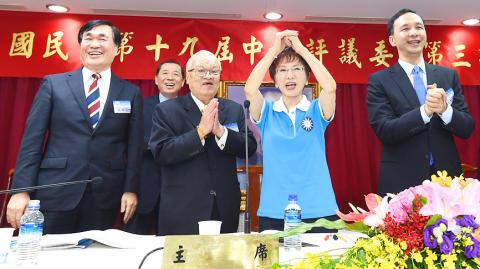New Taipei City Mayor Eric Chu (朱立倫) yesterday urged people to vote to keep the Chinese Nationalist Party (KMT) in power in next year’s presidential and legislative elections, saying it is the key to laying the foundation for the nation’s continued economic prosperity and for peace across the Taiwan Strait.
The KMT chairman said that the nine-in-one elections in November last year were a major setback for the party, but the party would not be defeated in one battle.
The KMT is capable of self-reflection, and temporary setbacks are an incentive for the party to step back into the ring, Chu told a party meeting with KMT vice chairpersons Hau Lung-bin (郝龍斌) and Huang Min-hui (黃敏惠) as well as KMT presidential candidate Hung Hsiu-chu (洪秀柱).

Photo: Liu Hsin-de, Taipei Times
In response to media comments to: “Give us a reason why the KMT should continue to exist,” Chu said he could think of at least three reasons for its continued existence and why it should remain in power.
The KMT is trustworthy and has not used ethnic conflict to create social turmoil for its own political advantage, Chu said.
Having the KMT remain in power is the only way Taiwan can continue to prosper, with the party guiding the nation through the many economic challenges of the 21st century, he said.
The last and most severe challenge that only the KMT can resolve is its “appropriate” handling of cross-strait issues and maintaining steady development of cross-strait relations, Chu said.
Over the past eight years, the Democratic Progressive Party (DPP) has continued to promote cross-strait conflict, endangering the peace that has been achieved over this period, Chu said.
He added that only with the KMT at the helm of the nation can there be a lasting foundation for stable development of the nation’s economy and cross-strait relations.
Chu called for party solidarity and joint support for Hung, as the party prepares for the Jan. 16 presidential and legislative elctions, adding that if everyone worked together, the party would be able to prevail in both polls.
Responding to Chu’s remarks, Academia Sinica researcher Huang Kuo-chang (黃國昌) said on Facebook why he thinks the KMT should be voted out as the ruling party.
The KMT has, for its own political benefit, rejected multiple proposals for reform and broken the principles of constitutional government by initiating the “September strife,” Huang said.
The “September strife” refers to the incident in 2013 in which President Ma Ying-jeou (馬英九) accused Legislative Speaker Wang Jin-pyng (王金平) of illegally trying to influence the judiciary, and tried to revoke Wang’s KMT membership and invalidate his status as a KMT legislator-at-large, which would have stripped him of his position as speaker.
Instead of the KMT’s claims of national prosperity during its seven years of governance, wages have regressed, the rich-and-poor divide has deepened and young people have a bleak view of the future, especially with soaring real-estate prices, Huang added.
The China-leaning policies of the Ma administration has greatly hurt Taiwanese democratic values and repressed human rights, as well as sacrificed Taiwan’s development, Huang said.
There are multiple reasons that the KMT should not be allowed to continue as the ruling party and even more reasons to diminish the party’s influence in the Legislative Yuan by not allowing it to gain a majority, Huang said.

Taiwanese were praised for their composure after a video filmed by Taiwanese tourists capturing the moment a magnitude 7.5 earthquake struck Japan’s Aomori Prefecture went viral on social media. The video shows a hotel room shaking violently amid Monday’s quake, with objects falling to the ground. Two Taiwanese began filming with their mobile phones, while two others held the sides of a TV to prevent it from falling. When the shaking stopped, the pair calmly took down the TV and laid it flat on a tatami mat, the video shows. The video also captured the group talking about the safety of their companions bathing

US climber Alex Honnold is to attempt to scale Taipei 101 without a rope and harness in a live Netflix special on Jan. 24, the streaming platform announced on Wednesday. Accounting for the time difference, the two-hour broadcast of Honnold’s climb, called Skyscraper Live, is to air on Jan. 23 in the US, Netflix said in a statement. Honnold, 40, was the first person ever to free solo climb the 900m El Capitan rock formation in Yosemite National Park — a feat that was recorded and later made into the 2018 documentary film Free Solo. Netflix previewed Skyscraper Live in October, after videos

Starting on Jan. 1, YouBike riders must have insurance to use the service, and a six-month trial of NT$5 coupons under certain conditions would be implemented to balance bike shortages, a joint statement from transportation departments across Taipei, New Taipei City and Taoyuan announced yesterday. The rental bike system operator said that coupons would be offered to riders to rent bikes from full stations, for riders who take out an electric-assisted bike from a full station, and for riders who return a bike to an empty station. All riders with YouBike accounts are automatically eligible for the program, and each membership account

A classified Pentagon-produced, multiyear assessment — the Overmatch brief — highlighted unreported Chinese capabilities to destroy US military assets and identified US supply chain choke points, painting a disturbing picture of waning US military might, a New York Times editorial published on Monday said. US Secretary of Defense Pete Hegseth’s comments in November last year that “we lose every time” in Pentagon-conducted war games pitting the US against China further highlighted the uncertainty about the US’ capability to intervene in the event of a Chinese invasion of Taiwan. “It shows the Pentagon’s overreliance on expensive, vulnerable weapons as adversaries field cheap, technologically